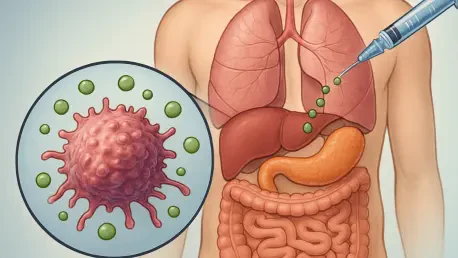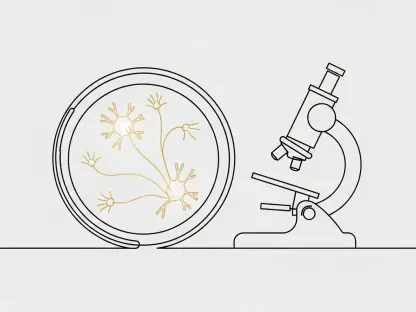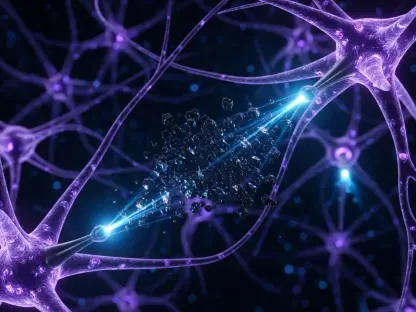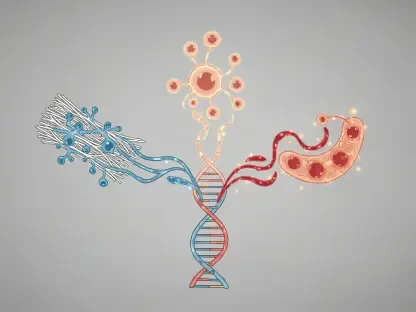Could a single enzyme hold the key to transforming outcomes for one of the deadliest cancers known to medicine? Pancreatic cancer, with its dismal survival rates and relentless spread, claims countless lives each year, often leaving patients and families with little hope. Yet, a groundbreaking therapy targeting an enzyme called Pin1 is emerging as a potential game-changer, offering a lifeline to those battling advanced stages and deadly metastases. This innovative approach, born from cutting-edge research, may finally crack open new possibilities in a field desperate for solutions.
Why Pancreatic Cancer Remains a Formidable Foe
Pancreatic cancer stands as a silent predator, frequently undetected until it reaches advanced stages where treatment options dwindle. With a five-year survival rate lingering around 10%, and even grimmer for cases involving peritoneal metastases—where cancer spreads to the abdominal lining—the stakes couldn’t be higher. Standard treatments like chemotherapy often fail against this disease, as the cancer cells hide behind a fortress of fibrous tissue and supportive cells known as the tumor microenvironment.
This protective shield not only blocks drugs but also fosters tumor growth, making innovation an urgent necessity. The complexity of this cancer lies not just in the malignant cells but in their surrounding ecosystem, which traditional therapies struggle to penetrate. Addressing both elements simultaneously has become a critical focus for researchers aiming to shift the tide against this relentless illness.
Pin1: The Hidden Culprit Fueling Cancer’s Advance
At the heart of this battle lies Pin1, an enzyme overexpressed in many tumors, including pancreatic cancer, that acts as a master switch for cancer progression. Pin1 manipulates harmful genes to promote tumor growth while suppressing protective ones that could halt it. This dual role makes it a prime target for therapies aiming to disrupt cancer at its core.
Unlike other proteins, Pin1’s influence extends beyond cancer cells to the supportive stroma around them, amplifying its destructive impact. Recognizing this, scientists have zeroed in on dismantling Pin1 entirely rather than merely blocking its activity. This shift in strategy could mark a turning point in how aggressive cancers are tackled, paving the way for more effective interventions.
A Revolutionary Therapy: Degrading Pin1 to Stop Metastases
A pioneering collaboration between the University of California, Riverside (UCR) and City of Hope has birthed a novel “molecular crowbar” strategy to degrade Pin1. Unlike conventional drugs that temporarily inhibit the enzyme, this approach eliminates it from the cellular environment, potentially delivering a more enduring blow to cancer. Preclinical studies in mouse models have shown remarkable results, particularly in suppressing peritoneal metastases—a complication with a mean survival of less than three months.
This therapy doesn’t stop at cancer cells; it also targets the tumor microenvironment, dismantling the protective network of cancer-associated fibroblasts and macrophages. By attacking on two fronts, the treatment disrupts the entire ecosystem that sustains tumor growth. Such a comprehensive strike offers a glimpse of what could become a transformative tool in oncology.
Voices from the Frontlines of Research
Leading this charge are Maurizio Pellecchia from UCR and Dr. Mustafa Raoof from City of Hope, whose joint efforts have pushed this therapy closer to reality. Pellecchia emphasizes the broader impact, stating, “Degrading Pin1 allows us to strike at the tumor and its supportive framework simultaneously.” Their work, backed by a National Cancer Institute U54 grant, has refined the compounds for better stability in the bloodstream, a crucial step for practical application.
Testing on patient-derived cancer cells at City of Hope has provided vital real-world data, bridging the gap between lab experiments and clinical potential. Dr. Raoof adds a note of cautious optimism, highlighting that while mouse model results are promising, the journey to human trials remains a critical next hurdle. Published in Molecular Therapy Oncology, these findings underscore the power of collaborative science in confronting one of medicine’s toughest challenges.
Charting the Path Toward Patient Impact
While still in preclinical stages, actionable steps are underway to bring this Pin1 therapy to those in need. Refining the drug design to ensure compounds remain effective long enough to reach tumors is a top priority for the research team. This focus on stability could determine the therapy’s success in real-world conditions.
Beyond pancreatic cancer, plans to test the approach on other gastrointestinal cancers with peritoneal metastases are gaining traction, potentially broadening its reach. Partnerships like the one between UCR and City of Hope aim to accelerate clinical trials, leveraging extensive clinical networks to impact patients across Southern California and beyond. These efforts lay a clear roadmap for translating laboratory breakthroughs into tangible hope for countless individuals.
Reflecting on a Milestone in Cancer Research
Looking back, the strides made in targeting Pin1 stand as a beacon of progress in the fight against pancreatic cancer. The collaborative spirit between academic and clinical institutions has ignited a spark that reshapes approaches to treatment-resistant diseases. Each discovery, from degrading a harmful enzyme to tackling the tumor’s protective shield, has built a foundation for change.
As the research advances, the focus shifts to actionable next steps, like streamlining clinical trials and expanding testing to other deadly cancers. The potential to transform outcomes for patients with limited options has fueled a renewed commitment to innovation. This journey, though challenging, has opened doors to a future where even the most formidable cancers might one day be met with effective solutions.









